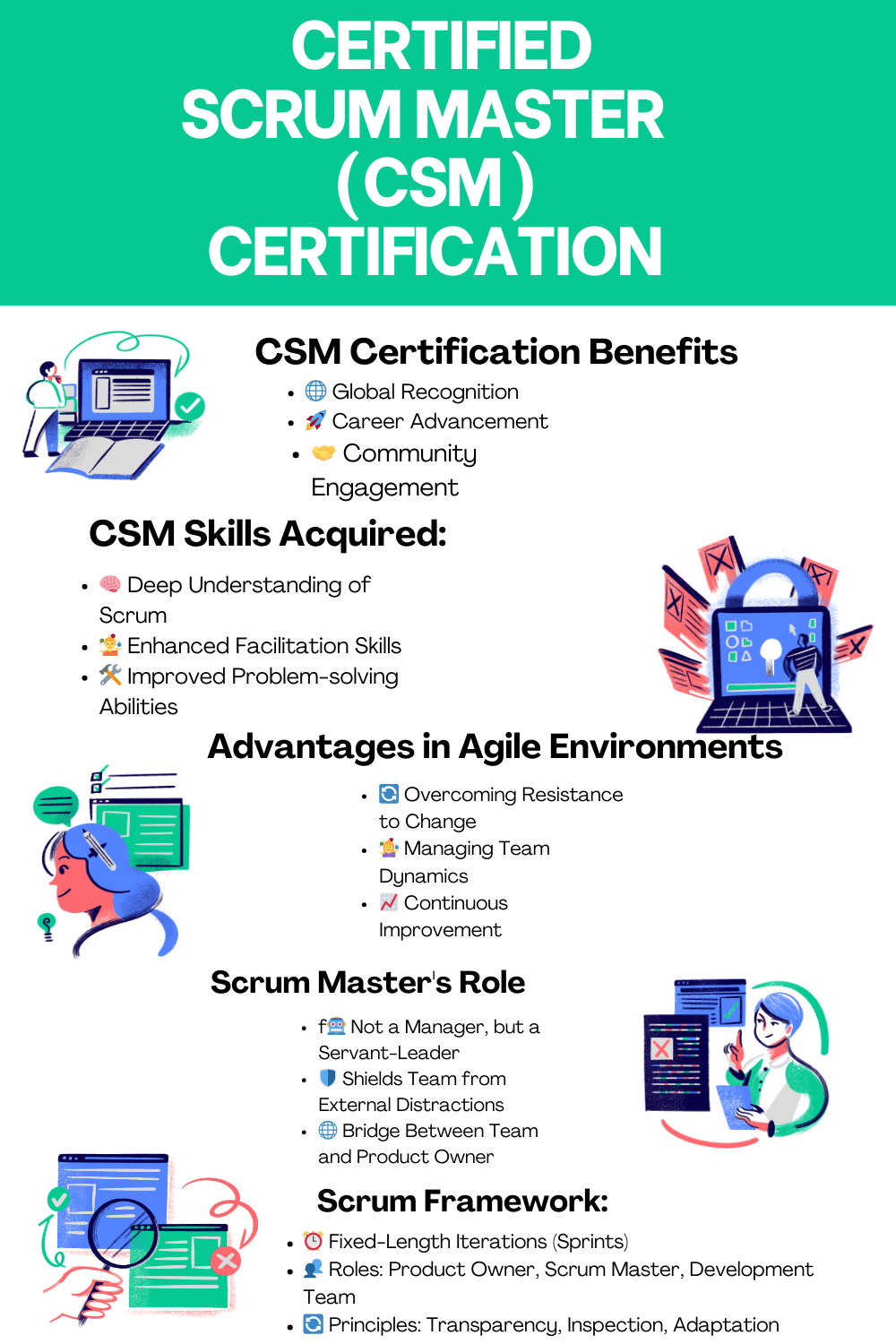
In the dynamic landscape of software development and projectmanagement, agility has become a key differentiator for success. Businesses areincreasingly adopting Agile methodologies to enhance collaboration, improveflexibility, and deliver value to customers more efficiently. At the heart ofAgile lies Scrum, a popular framework that empowers teams to adapt to changeand deliver high-quality products. In this blog post, we'll explore the role ofa Certified Scrum Master (CSM) and the significance of obtaining thiscertification in the world of Agile project management.
UnderstandingScrum: The Pillar of Agile
Before delving into the CSM certification, let's take amoment to understand Scrum. Developed by Ken Schwaber and Jeff Sutherland,Scrum is an Agile framework designed to help teams develop and deliverhigh-quality products. It is based on the principles of transparency,inspection, and adaptation, providing a structured yet flexible approach toproject management.
Scrum divides the development process into fixed-lengthiterations called sprints, typically lasting two to four weeks. Each sprintfocuses on delivering a potentially shippable product increment, allowing forfrequent inspection and adaptation. Key roles in Scrum include the ProductOwner, Scrum Master, and the Development Team.
The CrucialRole of a Scrum Master
The Scrum Master is a pivotal role within the Scrumframework. Unlike traditional project managers, a Scrum Master is not a managerbut a servant-leader who facilitates the Scrum process and helps the teamachieve its goals. The Scrum Master is responsible for ensuring that the team followsScrum practices, removing impediments, and fostering a culture of continuousimprovement.
In essence, a Scrum Master wears multiple hats – a coach, amentor, and a facilitator. They shield the team from external distractions,empower the team to self-organize, and act as a bridge between the team and theproduct owner. The role is instrumental in promoting collaboration andcommunication, key principles of Agile methodologies.
The Path toMastery: Certified Scrum Master (CSM) Certification
The Certified Scrum Master (CSM) certification is a globallyrecognized credential offered by the Scrum Alliance. It validates anindividual's understanding of Scrum principles, roles, and practices, as wellas their ability to apply them in real-world situations. Obtaining CSMcertification involves completing a two-day training course led by a certifiedScrum trainer.
The CSM certification is not just a badge on a resume; itrepresents a commitment to Agile principles and continuous improvement. Itequips individuals with the knowledge and skills needed to guide teams throughthe Scrum framework effectively. Let's explore why CSM certification isconsidered a valuable asset in the professional landscape.
Advantagesof CSM Certification
1. DeepUnderstanding of Scrum:
CSM certification provides a comprehensive understanding ofScrum, covering its principles, roles, events, and artifacts. This knowledge iscrucial for anyone involved in Agile project management, from team members tostakeholders.
2. EnhancedFacilitation Skills:
A Scrum Master's role involves facilitating meetings,discussions, and decision-making processes. CSM certification equipsindividuals with the skills needed to lead teams, resolve conflicts, and fostera collaborative environment.
3. ImprovedProblem-solving Abilities:
The training involved in obtaining CSM certificationemphasizes the identification and resolution of impediments. This skill isinvaluable for a Scrum Master in ensuring that the team can work seamlessly andachieve its goals.
4. GlobalRecognition:
The Scrum Alliance is a globally recognized organization,and CSM certification is respected across industries. Having this certificationon your resume demonstrates your commitment to professional development andadherence to industry best practices.
5. CareerAdvancement:
CSM certification opens doors to new career opportunities.Many organizations specifically seek Scrum Masters with CSM certification,making it a valuable asset for career growth in Agile environments.
6. CommunityEngagement:
CSM certification grants access to the Scrum Alliancecommunity, providing opportunities for networking, knowledge sharing, andcontinuous learning. Engaging with this community enhances professional growthand keeps practitioners updated on industry trends.
OvercomingChallenges in Agile Environments
While CSM certification offers numerous benefits, it'sessential to recognize and address the challenges that Scrum Masters mayencounter in Agile environments. These challenges include resistance to change,team dynamics, and the need for continuous improvement.
1.Resistance to Change:
Introducing Agile practices may face resistance from teammembers accustomed to traditional project management methodologies. A skilledScrum Master understands change dynamics and employs effective communication toguide the team through the transition.
2. TeamDynamics:
Managing diverse team dynamics can be challenging. A ScrumMaster needs to foster a culture of collaboration and open communication,ensuring that each team member feels heard and valued.
3.Continuous Improvement:
Agile principles emphasize continuous improvement, butimplementing changes and improvements requires a strategic approach. A CSM isequipped to identify areas for improvement and guide the team in makingincremental changes over time.
The Futureof Agile and CSM
As organizations continue to embrace Agile methodologies,the demand for skilled Scrum Masters is expected to rise. The role of a ScrumMaster is not static; it evolves with the changing needs of the organizationand the industry. Therefore, ongoing professional development and stayingupdated on Agile practices are crucial for maintaining the effectiveness of aScrum Master.
In conclusion, the journey to becoming a Certified ScrumMaster is a transformative experience. It goes beyond acquiring acertification; it's about embracing a mindset of continuous improvement,collaboration, and adaptability. Whether you are a seasoned project manager ora newcomer to Agile, CSM certification can be a catalyst for your career growthand a contribution to the success of Agile teams worldwide.
As you embark on the path to CSM certification, rememberthat it's not just a destination but a journey towards unlocking the full potentialof Agile excellence. The knowledge and skills gained through CSM certificationempower you to lead teams, navigate challenges, and drive successful outcomesin the ever-evolving landscape of Agile project management.tle here.
